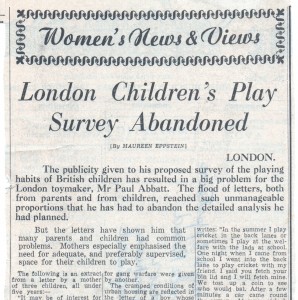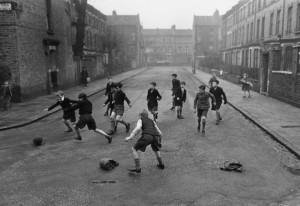Little boys in their own words
A few months after I interviewed Paul Abbatt, the London toymaker and child development theorist (see my previous blog piece, “An advocate for junk heaps”), I called to ask about his planned survey on what children actually did in their outdoor play. He sighed. The response had been so overwhelming that he’d had to abandon his plans for a detailed analysis. But he did share with me a sampling of the letters he’d received.
The follow-up story I wrote for my New Zealand paper, the Christchurch Press, was published in November 1963. It is transcribed below.
London Children’s Play Survey Abandoned
The publicity given to his proposed survey of the playing habits of British children has resulted in a big problem for the London toymaker, Mr Paul Abbatt. The flood of letters, both from parents and from children, reached such unmanageable proportions that he has had to abandon the detailed analysis he had planned.
But the letters have shown him that many parents and children had common problems. Mothers especially emphasised the need for adequate, and preferably supervised, space for their children to play.
The following is an extract from a letter by a mother of three children, all under five years:–
“It may be of interest for you to know that Crawley is a New Town—the so-called ‘Planner’s Dream.’ It is a ‘Mum’s Nightmare.’ My neighbourhood has no children’s playground, and has not had one for four years. So my children play in the road. Afternoon walks are too often an uninteresting march down roads of which the uniformity is quite paralysing.”
The mother of a boy of eight years says she could do with an attendant in the nearby park, “so that we would not be afraid to let the boy play there alone—an attendant to keep in check the bullying of older boys and help in case of accident with the swings. So, although only 100 yards away, he never goes.”
Many letters from mothers and particularly those from the children, showed children’s love for simple things, and places to make dens. A small boy of 10 gave detailed instructions on how to make a camp in a tree or cave, with the concluding remark: “Then all you need is some things to put in.” Another boy described how he and his friends caught rats on an allotment. A boy of 11 started his letter: “One Saturday when we didn’t know what to do we decided to go on a bike ride.” After several adventures they came to a secret place that one of them knew. “We went down a bank very slowly and we turned into a kind of glade. It was great. There was a stream flowing by and a smashing high tree to climb.”
Looking for the tracks of wild animals was a special memory for one boy, while the letter of another resounded with such names as Steam Engine No. 62004, Class Q.6 and Diesel Deltic, Type 5, No. D9007. Detailed rules for gang warfare were given by another.
The cramped conditions of urban housing are reflected in the letter of a boy whose favourite sport is cricket. He writes: “In summer I play cricket in the back lanes or sometimes I play at the welfare with the lads at school. One night when I came from school I went into the back lane to play cricket with my friends. I said you fetch your bin lid and I will fetch mine. We tost up a coin to see who would bat. After a few minutes a car came round the corner. At seven o’clock my mam came to the door and told me to have a bath. I went in unhappy.
“In the winter when the days are shorter and it’s dark at four o’clock I play football in the lane. Sometimes when it is raining I have a game of football in the yard. One day I kicked the ball that hard, I heard ‘smash’ one pint of milk rolling down the yard.
“Cricket is my best sport. One time my dad was having a game of cricket with me; he was in batting. I bowled, my dad hit it with such a ‘wham’ he smashed the window.”


“Looking for the tracks of wild animals was a special memory.” Love this, Maureen! There’s something so instructive about your nostalgic account of play in our older world. It’s something we can still do with kids — and I appreciate being reminded of this. Thank you.